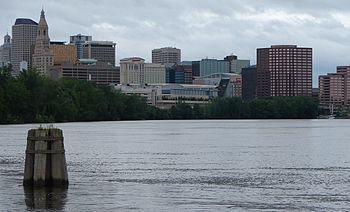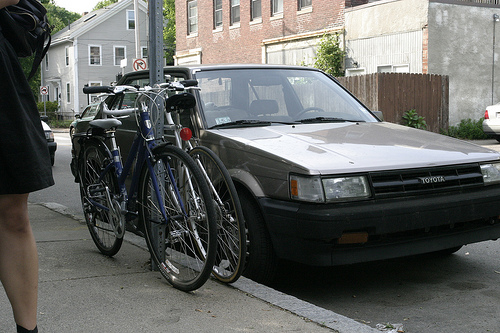Study: Publicly owned parking reduces city revenue
Forthcoming studies from researchers at the University of Connecticut (UConn) reveal that some car-centric cities are losing out on revenue by using publicly owned land for parking rather than other, more lucrative alternatives.
One study looked at six cities—Arlington, VA; Berkeley, CA; Cambridge, MA; Hartford, CT; Lowell, MS; and New Haven, CT—between 1960 and 2000 to discover the socioeconomic impacts of parking in that forty-year period. In the first three cities, there was modest parking growth during that time period; in the remaining three, parking growth was much more robust.
In Cambridge, for instance, parking increased 39 percent, while usable building area—the result of multiplying a building’s footprint with its height—went up 46 percent. But in Hartford, parking jumped 158 percent, while usable building area increased at a less impressive rate: just 27 percent. Explains Norman Garrick, an associate professor of civil and environmental engineering at UConn and an author of one of the studies, “In Cambridge, they tax parking at a higher rate than any other use, while in Hartford, they tax parking at a lower rate.”
While it’s uncertain how each city arrived at the public policies that governed leaders’ decisions, the studies are clear about the fiscal outcomes of those decisions: cities that prioritize parking forfeit municipal revenue. Researchers found that land devoted to buildings contributes at least 88 percent of tax revenue and occasionally as much as 97 percent. Parking? Not so much. In fact, very little. Cities that feature more parking get less money for their trouble—see Detroit for an example and note the other ills, such as empty storefronts and higher crime rates, that can result from streets composed primarily of parking spaces and garages.
Is the money lost really that significant, though? Well, yes. In Hartford, the city loses approximately $1,200 per year per parking spot. That’s a subsidy of more than $50 million annually, Garrick told the media. In cities like Cambridge, where parking is more closely monitored, as well as more heavily taxed, the public ledger doesn’t bleed money.
For those cities that are more like Hartford than Cambridge, Garrick recommends updates of their tax incentives and minimum-parking requirements. (Many cities still require a minimum number of parking spaces for each new development.) Garrick also suggests improvements to cities’ public transit systems and the installation of bike lanes.
Indeed, he notes that vehicles require more space any other mode of transportation. “For each person, a car takes up more space than a bike, fifteen times more than a train, and thirty times more than a person,” he wrote in an email. “Space equals money in one way or the other.”
Related Posts
Category: Uncategorized



















